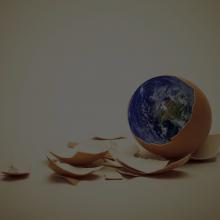New Creation
Artist Makoto Fujimura uses materials and techniques from nihonga, a Japanese style of painting. The pigments are pulverized minerals and precious metals applied in multiple layers, in what he describes as “a slow process that fights against efficiency.” Prayer and contemplation are woven into the work. The tiny mineral particles refract light, often creating subtle prismatic effects. It is a style of art made for the type of long, unforced gaze that slowly reveals evermore depth. Deceptively simple and quietly extravagant.
Fujimura’s thoughts on art, theology, and culture are, like his paintings, many-layered and refractive, celebrating God as love, beauty, and mercy while also contending with pain and desolation. He is a mystic as well as a painter, and in his latest book, Art and Faith: A Theology of Making, he speaks out of his spiritual and his artistic practice.
But Fujimura also builds on three decades of reaching far outside his studio to evangelize on the necessity of art for human thriving and the call to shift from fighting over culture to caring for and nurturing it. He founded the International Arts Movement in 1992, which facilitates connections and communication between groups seeking to creatively and positively impact the culture, whether they are from the arts, music, business, education, or social change organizations.

Image via Filipchuk Oleg/Shutterstock.com
I recently picked up a fascinating book called Octavia's Brood co-edited by Walidah Imarisha and adrienne maree brown.
In a discussion about the book, Walidah Imarisha said, "All organizing is science fiction. What does a world without poverty look like? What does a world without prisons look like? What does a world with everyone having enough food and clothing look like? We don't know. It's science fiction, and it is as foreign to us as the Klingon homeworld."
I had never heard of organizing being discussed in such a way, and it led me to reflect on the importance of envisioning and dreaming of the kind of society we fight to create. I also found myself reflecting on this statement in a different light: All organizing is also theological and spiritual. A simple explanation of this is that organizing and activism is faith in action.
The bearer of Good News, the one who carries the message of Resurrection, is not motivated by fear of punishment (either for herself or others) but by confidence in her experience of the love of God. She knows God's love is greater than anything in herself or in her hearers; that Jesus can conquer anything in them that is not controlled by holy love.
"Such love has no fear, because perfect love expels all fear. If we are afraid, it is for fear of punishment, and this shows that we have not fully experienced his perfect love." 1 John 4:18
God's love has the final word, for Jesus has conquered the sin of the whole world and has defeated the grave. Christ's best messengers know this love by its all-consuming redemptive activity in themselves and confidently carry this love to others, without fear.

